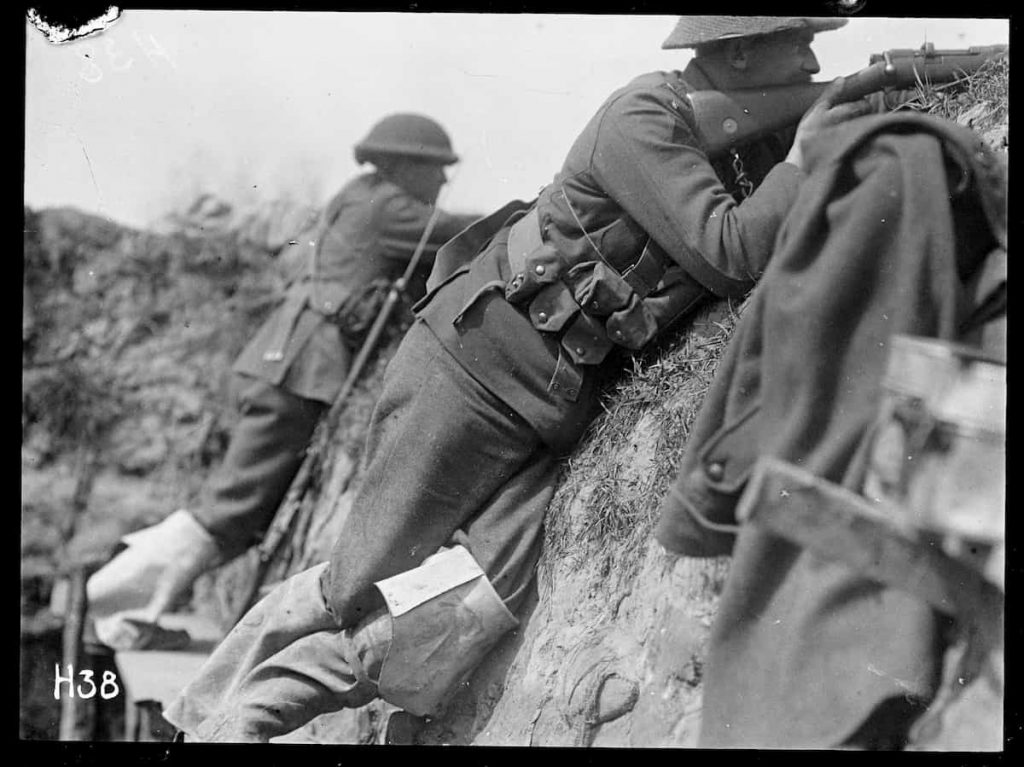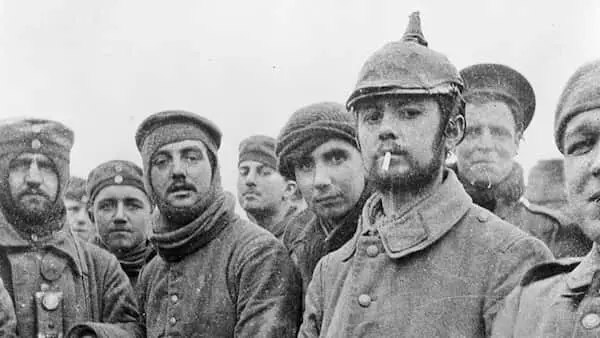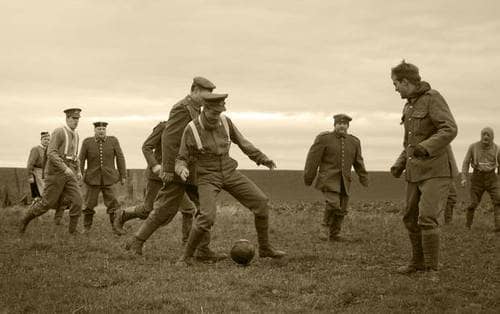Did the German, French, and British troops on the western front in 1914 join in a spontaneous ceasefire directly on the battlefield to celebrate Christmas?

World War I
The truce at Christmas 1914
The first World War lasted from 28 July 1914 to 11 November 1918. It was one of the largest and deadliest conflicts in human history. Almost 70.000.000 soldiers were engaged. At the end of the war, more than 19 countries were directly involved in military action, but many more were affected.
Around 10 million soldiers died. To that is added the death of around 8 million civilians. At the end of the war and immediately after, the Spanish flu caused millions of casualties around the globe. The worldwide spreading of the disease could largely be blamed on the war. Soldiers living close together, under unhealthy conditions, staying in field hospitals, and then being transferred home or back to the front. The Spanish flu caused between 17 and 100 million deaths worldwide.
The War of the Trenches
World War I was in many locations a war of the trenches. In continental Europe. especially on the western front, in northern France, the battles were fought dug in. At the beginning of the 20th century, the firepower of the artillery had reached modern warfare capacity. But the mobility of the military units had not. They had cannons, but no tanks. Because of this, the defense was much more efficient than the attack.
The trenches between the German, French and British armed forces were heavily armed, dug deep, and reinforced by concrete and barbed wire.

The area between two such trench lines was exposed and full of mines. This made warfare extremely static. The fronts were fixed and the battles went on for months, even years, without any side gaining terrain.
In the trenches, the conditions were often disastrous. It was wet, cold, and otherwise very unhealthy with diseases and malnutrition. In fact, in the first months in many regiments, there were more deaths caused by gangrene, trench foot, and frost than from enemy fire.
Chemical warfare
The war was also a breeding ground for new ways to kill. Chemical warfare was developed and in the very static positions in the trenches, gas was something many military leaders put great hope in. But for various reasons, it never changed the way war was fought.
Launching sufficient quantities and gaining a concentration at enemy lines enough for it to be lethal, was all very difficult. In fact, the gas was not at all as efficient as first believed, and it wasn’t until the infamous Mustard-gas was introduced in late 1915, that it started to be of any concern at all. In 1914 no gas attacks had yet been successful.
The truce at Christmas 1914 – The background.
- In the first period of the war, the hostility between the Germans and the Allies hadn’t yet become as bitter as it would develop, later on in the war.
- The soldiers were to a large degree volunteers who had been promised that the war should be over by Christmas.
- At the end of 1914, it was evident that it would last much longer, and that this was just the beginning. There could have been second thoughts about why they had enrolled in the first place.
- Although the superiors tried to maintain the morale, the men often got reluctant to see the enemy as evil. The desperate situation provoked resignation rather than aggression.
- Many British soldiers didn’t regard the Germans with as much aversion as did the French. The truce was more frequent between the Germans and the British than between the Germans and the French.
- The war in the trenches slowly turned into a job-like activity. No man can fight 24/7, so the fighting needed a schedule, start and stop times, pauses, etc.
How was it possible?

Already in November, there had been occasions where the soldiers stopped fighting. F.ex. in some locations the soldiers stopped shooting for a period after nightfall. This was the time when food rations were distributed and it was a mutual agreement that everybody should be able to at least eat in peace. Sometimes they agreed on letting the soldiers get out of the trenches to pick up their dead and bring them back for a short funeral.
These accords happened every now and then. Between the French and the Germans, the tension was stronger but even they sometimes tried to get along in these matters. And not only in the west but also between the Russians and the Hungary-Austrians there were spontaneous truces.
As the army lines were reasonably close. Being defended by the trench and heavily dug in, the soldiers could speak to one another. News, sports-results, and even singing were shared across the front line.
Where and when did it happen?
In fact, in some locations, the truce at Christmas 1914 started out as a concert. Allied soldiers heard the Germans singing their Christmas songs. The Christmas trees were lit. This was at the time a tradition that was not widely spread in Britain and the British soldiers ventured out of the trenches to get a look and to hear the singing.
The Truce at Christmas 1914 was a mutual, spontaneous ceasefire. The soldiers traded cigarettes, food, alcohol, and souvenirs. British soldiers narrated that they cut off buttons from the German uniforms as a token. They sang together and talked about their homes and their loved ones. There are even stories about football games between the Germans and the British. In many locations, it was also a possibility for bringing back the dead from the battlefields.
In some places, it was just a ceasefire but without encountering. The soldiers just stopped shooting during the holiday.
What happened was a phenomenon of 1914 and only 1914. Already in 1915 the bitterness and hostility between the armies didn’t permit ceasefires to the same extent. In some locations at the front tentatives were made to do something similar. The officers on both sides had gotten strict orders to prevent any repeat of the previous Christmas’ event, though.
Around 100.000 soldiers participated in the truce at Christmas 1914.
What can we learn from spontaneous peace like the one in 1914?
The truce at Christmas 1914 wasn’t unique. All through the war agreements were made here and there between fighting soldiers. Often just to be able to bury the dead or to rest for an hour or two from the obscenities of the war. In spring 1915 a spontaneous truce was held between Bulgarians and Greeks, as well as between Australians and Turks.
And in many other wars, these very small windows of fraternization have occurred. It’s as if we in front of the really big issues in life, the questions about life and death, learn something, and can see the very existence for what it is. The too young men in the trenches understood the issue, that we often have such difficulty grasping… That the real enemy is War itself.
Conclusion
Yes, At Christmas 1914 many soldiers on the western front, joined in a spontaneous ceasefire and celebrated Christmas together, trading souvenirs, tobacco, alcohol, and singing songs.

sources